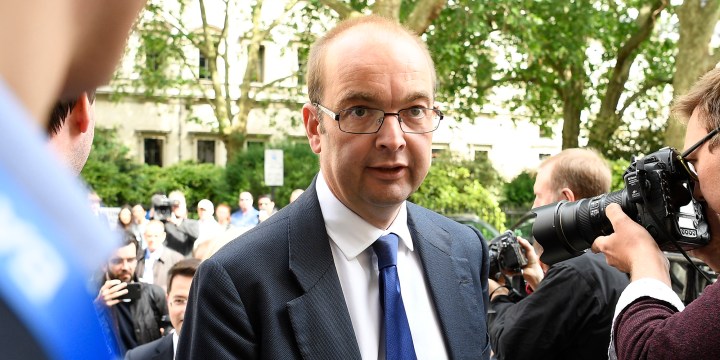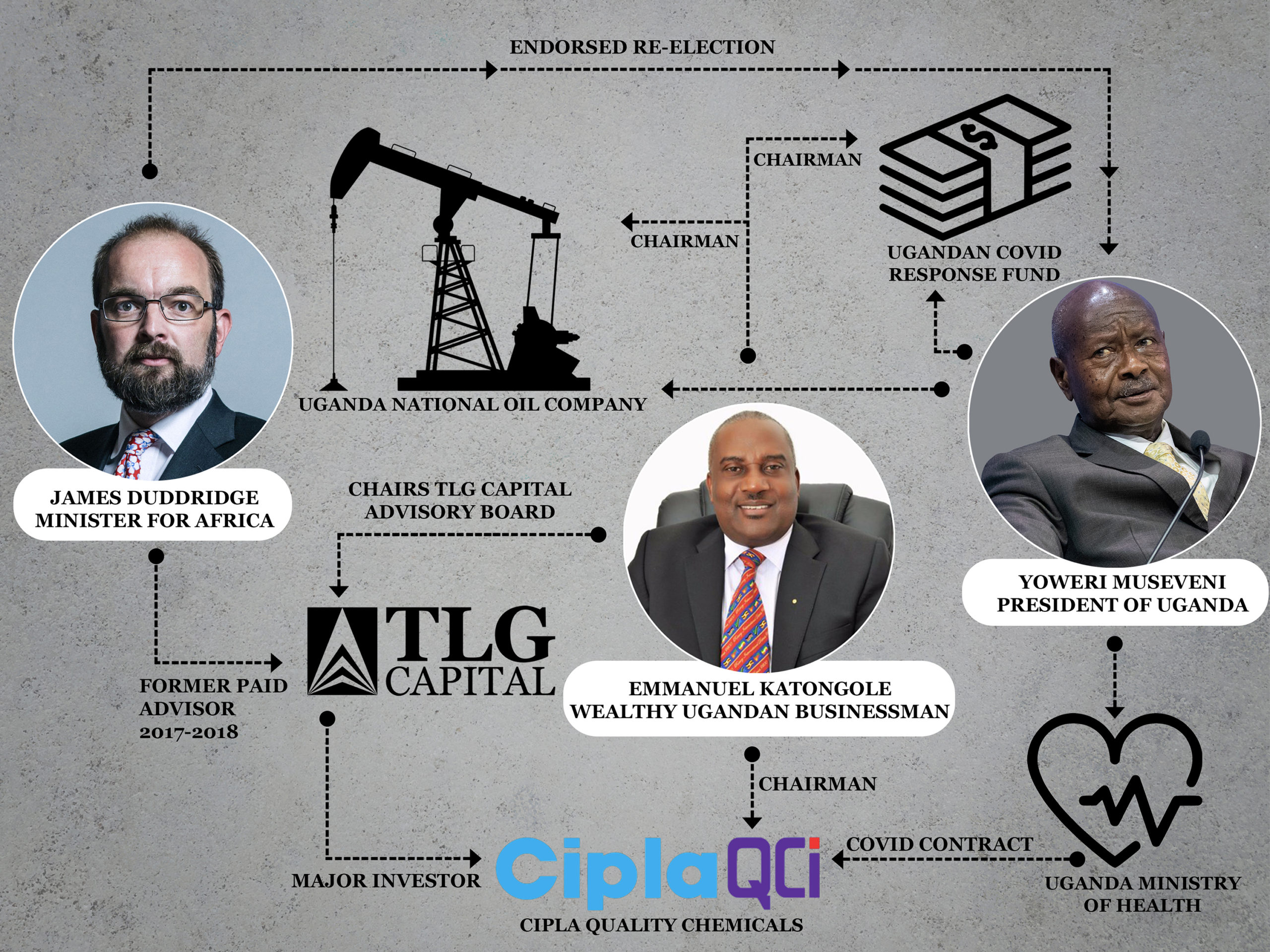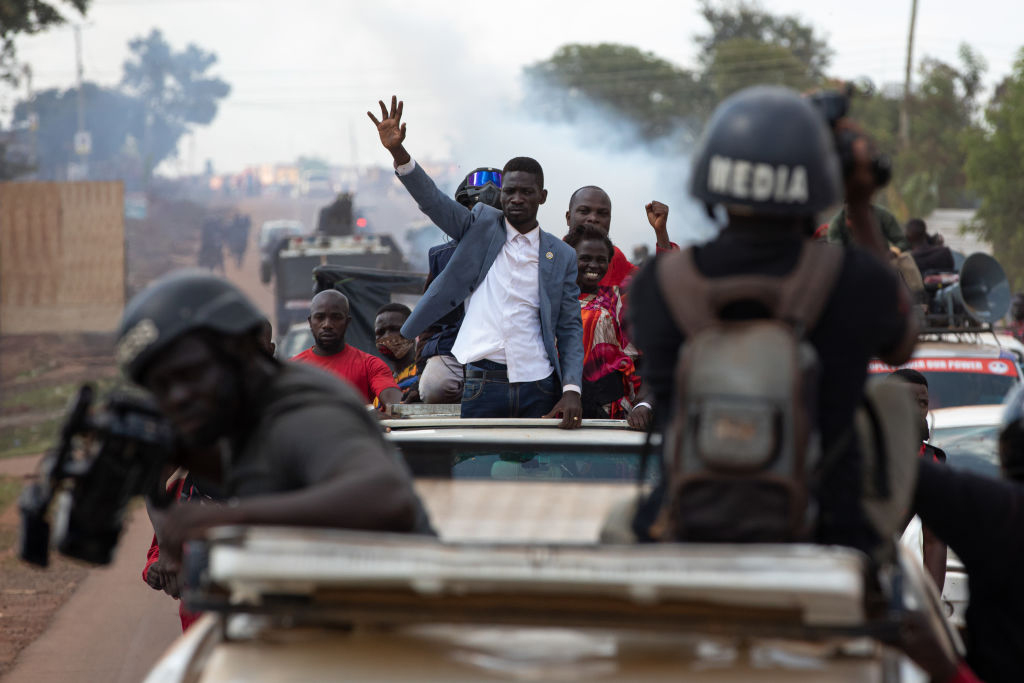DECLASSIFIED UK
Britain’s Africa minister, who welcomed Uganda’s flawed election, had business ties to an ally of the country’s president

James Duddridge, Britain’s minister for Africa, earned tens of thousands of pounds as an adviser to a London-based finance house whose advisory board is chaired by an ally of Uganda’s authoritarian ruler, Yoweri Museveni. He also did not declare shareholdings in African companies to Parliament’s register of interests.
Britain’s minister for Africa, who endorsed disputed election results in Uganda last week, worked until recently for a company in which one of the country’s richest businessmen and an ally of its authoritarian president plays a leading role, Declassified UK has found.
The revelation comes after the UK’s Foreign Office whitewashed the re-election of Uganda’s President Yoweri Museveni, despite diplomats from the US and Europe raising serious concerns over voter suppression and access for international observers.
Dozens died on the campaign trail and Ugandan soldiers illegally held opposition leader Bobi Wine under house arrest during the poll – but Britain’s Africa minister, James Duddridge MP, was criticised by experts after he described the election as “relatively calm”.
It can now be revealed that Duddridge has earned at least £22,500 as an advisor to TLG Capital Investments, a London-based finance house whose advisory board is chaired by Ugandan multi-millionaire Emmanuel Katongole.

Infographic of James Duddridge’s business ties to Uganda’s elite. (Illustration: Leila Dougan)
Katongole is among Uganda’s wealthiest businessmen and trusted by Museveni, who has been in power since 1986, to run some of the East African nation’s most sensitive organisations.
Declassified understands that Duddridge ceased his role with TLG before taking up his ministerial position in February last year. However, his parliamentary register of interests states he still advises the company, despite rules requiring MPs to update their registers within 28 days of ceasing a second job.
He did not respond to requests for comment and the Foreign Office would only speak to Declassified “on background”.
Museveni has twice appointed Katongole to chair the state-owned Uganda National Oil Company, a role he currently holds. Museveni also picked Katongole to lead Uganda’s fundraising efforts in response to the coronavirus pandemic.
Katongole made his fortune running Cipla Quality Chemicals, a pharmaceutical company in which TLG is the second largest investor.
Cipla Quality Chemicals began as a public-private partnership with Museveni’s government, and last year Uganda’s health ministry reportedly awarded it a contract to make an anti-malarial drug, hydroxychloroquine, for coronavirus patients.
‘Vast potential’
Prior to joining TLG, Duddridge visited Uganda in December 2015 while serving as Africa minister at the Foreign Office. He met officials in Museveni’s government and said that, “Britain is eager to get into business with Uganda where they can support Public-Private Partnership [sic] like export financing and credit guarantee” schemes.
Duddridge then stood down as Africa minister but remained interested in Uganda. Along with Katongole and the managing director of TLG, he was due to speak in September 2016 at a Uganda Investment Convention in London.
The keynote speaker was Uganda’s prime minister, and guests were expected to “discover why global businesses and entrepreneurs are capitalising on the vast potential in Uganda”.

President Yoweri Museveni (left) with Emmanuel Katongole (right) at the inauguration of the board of the Uganda National Oil Company in 2015. (Photo: Uganda Radio Network)
The following year, in December 2017, Duddridge became an adviser to TLG alongside Katongole, working eight hours per month for the firm and charging it £2,500 a day, with an initial payment of £7,500.
According to parliamentary records filed last week, Duddridge advised and invoiced TLG on an “ad hoc basis” from July 2018. He was reappointed Africa minister in February 2020, by which time it is understood he had stopped working for TLG, although he failed to update his register of interests.
Timeline
- August 2013: Duddridge began making 12 investments across Africa
- August 2014-July 2016: Africa minister
- December 2017: Became adviser to TLG. Payments received: £7,500 and then £2,500 per month
- July 2018: Began ad hoc payment and advisory arrangement with TLG
- February 2020: Reappointed Africa minister. Understood to have stopped advising TLG by this point
- January 16, 2021: Endorsed President Museveni’s election win
- January 18, 2021: Parliamentary register of interests still includes ad hoc advisory role with TLG
Duddridge describes TLG as “a private investment firm focused on opportunities in Sub-Saharan Africa”. It is not known if he advised TLG specifically on its investments in Uganda, where it also holds a 49% stake in a bank.
After Duddridge ceased being Africa minister for the first time in 2016, parliament’s Advisory Committee on Business Appointments approved his role at TLG in 2017, despite noting that “it may potentially involve networking and having contact with senior officials in Africa”.
The committee is tasked with checking that former ministers do not benefit financially from their experience in government. A spokeswoman told Declassified it does not scrutinise former ministers who rejoin government, to see whether their second jobs pose any conflicts of interest.

Opposition leader Bobi Wine parades through crowds of people as a cloud of teargas fired by the police rises into the air in Kayunga District on 1 December 2020 in Jinja, Uganda. (Photo: Getty Images / Getty Images)
Banking on Africa
Duddridge has long made money from Africa, working for Barclays bank in Ivory Coast and Botswana before becoming an MP.
He told the Conservative Home blog in 2013 that he was buying shares in 12 companies across Africa, but has not registered those investments with Parliament’s public register of financial interests.
By 2014, Duddridge had investments in Nigeria’s stock exchange, a Kenyan brewery, a mine in Sierra Leone and a safari firm in Botswana. At the time, Duddridge was chair of the all-party parliamentary group for Africa.
Under the rules that applied to MPs at that time, even small investments were supposed to be registered if they “might reasonably be thought by others to influence his or her actions, speeches or votes in Parliament, or actions taken in his or her capacity as a Member of Parliament”. It is not clear if Duddridge disinvested from the companies upon becoming Africa minister for the first time in August 2014.
As a minister, Duddridge answered parliamentary questions about Kenya and Nigeria that year. He was criticised in 2017 for holding a second job with a lobbying company, Brand Communications, while sitting as an MP.
In response to Declassified’s investigation, a spokesperson for the Labour Party’s Shadow Foreign and Commonwealth Office team said: “Any suggestion of an actual or perceived conflict of interest is concerning, and warrants full transparency and a public clarification from the minister.”
Katongole and TLG were asked to comment. DM
Phil Miller is staff reporter at Declassified UK, an investigative journalism organisation that covers the UK’s role in the world.
Follow Declassified on Twitter, Facebook and YouTube. Sign up to receive Declassified’s monthly newsletter here. You can become a member and supporter of Declassified by visiting here.


















 Become an Insider
Become an Insider
Transparency my foot. The British are easily as good as SA’s for backhanders. Why else would he endorse this tyrant?
Countries are expected to pull themselves up by their bootstraps as it were. The problem is laziness. Corruption. Institutions. Policies. But, to me, this seems to individualise a global systemic problem. The game is rigged and developing countries get the short straw.
Benefitting from tin pot despots is the old colonial way is it not? Let’s hope this chap gets what’s coming to him as should Museveni and his sycophants. But then, I guess, you have to ask who fills the void left by their departure, more sycophants, more tin pot despots and colonial overlords. Come on Africa, we can do better than this surely?